- Limited Edition 25-Key Ultra-Portable USB MIDI Drum Pad & Keyboard Controller with sleek color change
- Compact keyboard controller easily fits backpack and studio production desk (12.4" long, 1.6 lbs)
- Powered by USB connection to computer, with free virtual-instrument download packages
- 25-synth-action mini-keys, 8 velocity-sensitive rubber drum pads with two banks, and eight assignable control knobs
- Includes VIP3.0 - the ground-breaking, award-winning music software platform that provides musicians and composers with a powerful hands-on control solution for their virtual instrument and virtual effect collection
- Please note, MPK Mini MKII's pads will only respond if there are sounds within the host DAW that are mapped to the MIDI notes that the pads are triggering
-
Information
-
Twitter
-
Pinterest
-
Youtube
-
Facebook
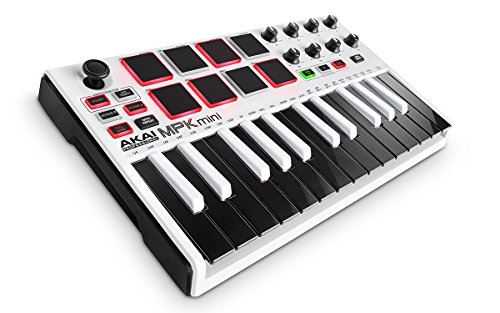
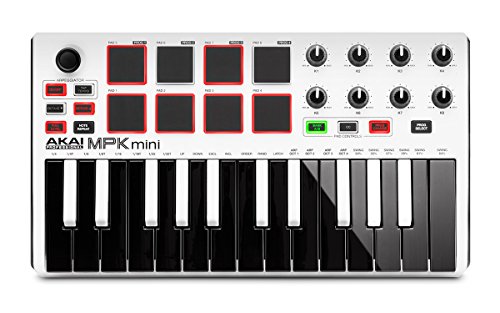
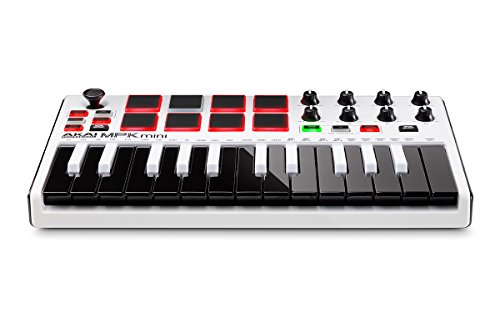
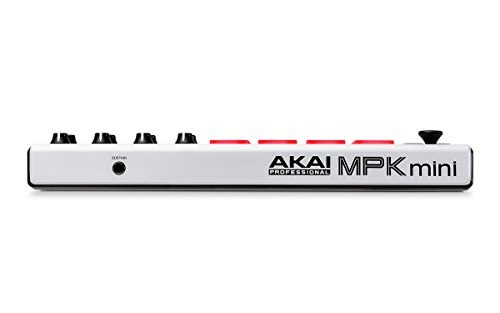
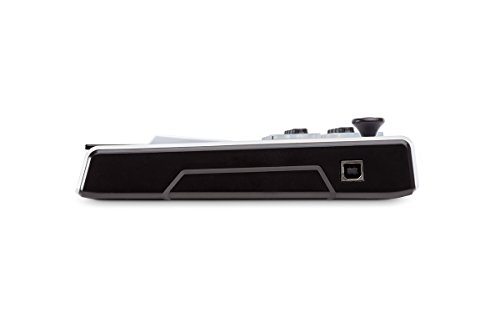
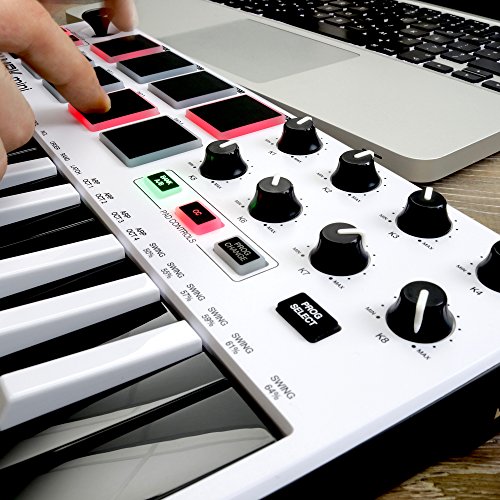

Sean Disney
This is a fantastic little midi-controller
This is a fantastic little midi-controller. I use it with my Mac Mini (OS X 10.8.5) running Logic X (it will also work with GarageBand and most other DAW's) and it works very well. It also works well with my M-Audio sustain pedal, it has a port for a sustain pedal in the back (in case you were wondering.) The packaging was fantastic. Included is the Keyboard, USB-Midi cable, instructions, and information on where and how to download your included software. The keyboad itself looks great. It is very streamline and has a great color scheme. A unique feature is the 4 way joystick for modulation and pitch control. I have to say I like it better than a typical wheel style control you see on other midi-controllers. It really helps keep the size of the keyboard down since you don't have to include those bulkier pitch and modulation wheels. It really helps make this a portable keyboard. Though someone who is use to the wheel style control might not like this feature. It takes a minute to get acclimated to. Right now my only complaint is that the keys are a little smaller than I was expecting. As you can see in my pictures, each key is about the size of a penny. They are completely usable but a little hard to get used to if you are use to a full size keyboard. This may or may not matter to you. If you have big fingers, I may recommend looking for something else. Of course this is not the manufacturer's fault, they list "mini keys" in the first description of the product so I am not going to knock any stars for that. I just thought they wouldn't be quite so mini. But the upside is that it makes the overall footprint very small, smaller than my computer keyboard infact. Also, unless you have nothing else, this isn't really the type of keyboard you (or atleast I) would use to put down a lot of notes. I think it's more for editing and mixing than for creating and composing, but if you really needed to you easily could. I think would be really neat if they made this same controller with normal sized keys. They make one similar (Akai Professional MPK25 25-Key USB MIDI Keyboard Controller with MPC Pads) but it has a lot more going on and is $80 more. Maybe I will invest in that someday. If you have larger fingers or don't like the mini-keys go check that one out. Anyway, in summary, fantastic little midi keyboard. Good price, great packaging, and great usability. I think this is a good keyboard to start out with as a beginner and even a good keyboard to have floating around if you are a pro. Pick it up, I don't think you will be disappointed.
John Clark
This controller is awesome and the drum pads rock
I tried the Novation Launchkey Mini controller but returned it in exchange for the Akai Mini MPK MKII. The Novation was basically setup for Ableton Live as a looper controller. I was thinking with the pads I could set it up to trigger drum sounds like a regular drum pad setup, but it was overkill (with the 12 pads)... With the Akai MPK MKII I plugged it into my MacBook Pro and it hooked right up with Logic Pro X and I was ready to go. IMPORTANT: The drum pad buttons are BETTER QUALITY than the Novation. With the Novation, neighboring lights were triggering when I hit a pad. The Akai was the answer! Plus the sustain pedal options is great. Highly recommended.
Bisma Farooq
Fun and cheap, but with a learning curve.
This is a great piece of equipment for a beginner musician, but there IS a learning curve, so please be aware of that when buying. What you are purchasing is a MIDI controller (Musical Instrument Digital Interface). Unlike a synthesizer, MIDI controllers do not produce sound without software. It's basically just a tool to control computer software. So after you've downloaded the software and plug it in, you will still not have any sound generated until you've set everything up properly and loaded sounds onto the pads. So I feel it is slightly inaccurate to call it a "plug-in and go", as some people do. Pros: - Its easy to use AFTER you have learned how to set up and use it. - Its fun. - A good way to get into digital music making. - Budget friendly. Cons: - The software setup is kind of intimidating but luckily there are easy-to-find tutorials to help you. - Akai itself doesn't seem to have much assistance in actually using the controller. Every useful tutorial I found was by someone else, not the company. It would be nice for them to take the time to make more tutorials. Unless I just didn't find them? Everything I found just had to do with setting up the software, nothing really about HOW to actually use it. -The software that is included is limited. You can't use the knobs with MPC Essentials, you need Ableton or something similar for that. Or rather, I should say, you can't use the knobs for effects in your track. I believe you can use it for other things but I still don't quite understand that part. I am still learning to use this but it has gotten significantly funner to use as I have learned more about it and found sounds I like. Just as a tip: - Make sure you know where all your files are saved when you setup the software. You will need to know where your VST stuff is so you can load it into MPC Essentials. -Use Program 2 when you're finally ready to start loading sounds in. Program 2 has the pads laid out in order in the software, so everything correlates properly. -Read the manual and do a lot of research if you are new to it. It's worth the time, trust me.
Anna Guzman
💪🏾💪🏾💪🏾💪🏾💪🏾💪🏾💪🏾💪🏾💪🏾💯💯💯💯💯💯💯💯💯💯
CONS: the ups man just dropped it on the porch and left, literally dropped it, it had no packaging so everyone who rode by my house saw exactly what it was. not at all rge sellers fault but amazon should be aware of how sloppy ups is. PROS: i love it. its perfect for learning & working on a professional level. look on youtube for help setting up. most people say its hard and ridiculous but you cant assume everyone is intelligent or possess common sense. if you just read, you'll be ok. and if your using a laptop, a 15.6" laptop back pack would hold the laptop, mpk mini, and all off your cords and accessories.
Vera Chang
but it's a lot of fun and it's made music production go a lot faster
Exactly what I was looking for. If you are just getting into music and don't want to spend too much, but want to have lots of flexibility, get this now - you won't regret it. And I know it will serve me well for a long time, even if I get other equipment. I still haven't figured out everything it can do, but it's a lot of fun and it's made music production go a lot faster. And I can perform live with it, by launching scenes with the drum pads or playing midi instruments live.
April LG Cabarubias
Best MIDI controller on a budget!
I'm a full-time student at a university, and on the side I like to make music--so I'm not doing anything huge here. I was looking at budget MIDI/USB controllers a couple months ago--and I came across the Akai Professional MPK Mini 25-Key Ultra-Portable USB MIDI Keyboard Controller. I was about to get it, but I saw people saying that the pads had a somewhat bad hit detection. After looking at some videos I confirmed this to be true, but there was also an easy fix for it (the electrical tape fix). After more research I saw that there was a second version of the MPK Mini coming out, except this one apparently had updated pads AND a new control knob (which I REALLY wanted). I figured I'd wait it out and buy it when it came out! So, I did and here's my review: As a preface, I was looking for a MIDI controller mostly because I make live music with programmed drums, and I wanted to get velocity-triggered pads to make them sound more realistic. I also make Instrumental Hip-Hop in the style of Nujabes, so I was keeping that in mind as well. Generally, I just wanted a really well-rounded keyboard that I could do a huge variety of things with. As soon as you plug the controller into the computer, the pre-loaded drivers install themselves and then you're ready to go. I had no issues with this step, and I'm using Windows 7. After that I loaded up my DAW of choice (FL Studio), and loaded a channel to get going. Everything was already completely working. I didn't have to mess with the MIDI settings at all! I actually didn't even know that the KEYS were also velocity-sensitive before I bought this keyboard, so that was a pleasant surprise as well. The pitch & mod knob by default on most things for me was pitch shifting, but in whatever DAW you use you should have no trouble mapping the knob to whatever you want. This being my first controller, everything else was on point 100%. I was worried about the pads still having the same hit detection issue as the last model, but that's not the case. In fact, by the time I got around to the second use the pads got MORE sensitive. You honestly don't need to hit very hard to get maximum velocity. What's also great is that there's a "full level" button which always plays the pads at max velocity no matter how hard you hit. I highly recommend reading the manual when you first get the keyboard, as it explains all the features pretty much on one page! Lastly, I'd like to talk about the arpeggiator. I think it's really nifty, and I love it a lot, but there's a serious problem I've been having with it. It doesn't automatically sync the tempo up to the computer, and it doesn't always play right when you hit the keys (I'm assuming that it's either one of the settings causing this, or something in the DAW itself--I'm still just a noob when it comes to MIDI controllers, so I'm sure that the MIDI clock isn't set up correctly). But since the arpeggiator runs on the tempo, you have to manually sync it up to the computer, and even then I still have issues. I'm sure there's a trick to make it auto-sync, but I haven't found it yet. It's just annoying when I'm trying to record with the arpeggiator and it doesn't start playing right when I hit the keys--it gives it about a one-second delay 60% of the time, even when I play right on the beat and/or I'm NOT recording. So, all in all, I HIGHLY recommend this to anyone looking to start out with a really well-rounded MIDI controller. It has so many features that seriously cannot be beaten for the price you pay. Pros: Great price Improved pads--overall very sensitive on my part Lots of control knobs and multiple programs/banks High variety of settings for arpeggiator and pads Velocity-sensitive keys/pads Worked immediately from initial plug-in Fast response Cons: Arepeggiator issues (most likely a DAW sync issue) Had a couple issues with mapping the knobs (probably the VST itself) Joystick was a little jerky at first, but it works in pretty quickly I still can't believe that I only paid $100 for this. Too incredible of a deal.
Joe Farrell
Love it!
Muhammad Ramzan
My favorite portable MIDI controller
This is a seriously sweet controller! Not perfect, but excellent for portable work with a MacBook or an iPad. I would say I don't understand why there are so many negative reviews, but I do. They are mostly from folks who just didn't understand what they were getting into... This is a MIDI controller. As such, it must be attached to a device that can interpret it and produce sound (Logic/GarageBand on a Mac, or GarageBand on an iPad, for instance). If you just want to tinkle the keys it'll work out of the box with either, but to really get some use out of it you're going to have to load the Editor software and dig in a little bit. I did a bit of research, and was able to map out the things I wanted to do. As it turns out, Apple has 16 drum sounds that are available for the drum kits (not drum machines) in both GarageBands (Mac & iOS) and Logic. Better yet, they share 16 note numbers to trigger them. So I was able to setup the 8 pads with all 16 sounds using the A/B switch, and was able to group the sounds physically on the pads so it worked for me. I used two different "Prog"s, so I could have 2 different layouts, and then used my P-Touch label maker on the smallest font to create labels that tell me which sounds are where. I had to cut the labels with scissors to make them fit between the pads, but it worked and now I can see exactly what's where even when I haven't used it for weeks or months. I did the same thing with the knobs. Assigned basic values (Channel Vol, Pan, Modulation) to the most convenient knobs, then picked some of the more esoteric MIDI CC values so I could play with them for the other knobs. And labelled the whole mess so I would remember it. The sensitivity of the keys and the pads is great; better than the LPK25 or the LPD8 I think. Doesn't have aftertouch, but that's about all I can see missing (and that isn't a reasonable expectation at this price point). My only problem was connecting it to an iPad Pro, but I think I've got that figured out. Using just the Apple Lightning to USB Camera Adapter didn't work; I got "Cannot Use Device. MPKmini2: The connected device requires too much power." Turns out I needed to connect it through a USB hub. I used an unpowered Satechi hub I had handy and it worked. That's got a long cord, though, so I'm going to try using a very inexpensive Sabrent 4-port unpowered USB 2.0 hub with a 6" cord. That should do the trick. The AmazonBasics 4-port 2.0 hub would be another option... The Editor software for this is MUCH easier to use than many I have tried. It's more straightforward than the editors for the LPK25 or the LPD8, and beats the Korg nano editors shamefully. And don't get me started on the Roli BLOCKS editor... Overall, this is the nicest portable MIDI controller I've found. Get the Khanka case for it and you'll be all set. Just make sure to put some dryer sheets or something in the Khanka case before you put the MPKmini in there; the case smells like something died... :)
Tey S Rith
SHOULD YOU OR SHOULD YOU NOT BUY THIS?
Perfect for beginners, and easy to use. I'm sure even pro's would enjoy this pad. It's a bit difficult setting up things within a DAW at first but it gets easier with consistent practice. Quality materials, really gotta appreciate that! I think this is definitely worth the money, if you're a bit more familiar with pads and DAW's and you have the cash, I'd get the bigger version of this brand which is pretty freaking awesome. It comes with a bigger "work space" (more pads, nobs and a full keyboard). If you're a beginner and you don't know much about DAW's and you're just getting started and don't have much cash I'd purchase this. ON ANOTHER NOTE! If you are a beginner and you have some extra cash go ahead and buy the bigger version, it'll be of use longer as it has quite a bit to work with.
Casey Strunk
Awesome Portable Instrument - Works out of the Box with Certain Software
I've been using the Akai Mini MKII for around a month now and I really like it so far! I've been on the search for a portable MIDI keyboard that I can easily setup and put away as needed and this fit the bill perfectly. The build quality is really good. It feels like it's made of sturdy material and is a quality product. Nothing feels fragile, like it's going to fall off. It feels very well made. As for being plug-and-play, I think it is for the most part. As long as you already have music creation software installed on your computer. I did not have to install any drivers to get it working. I tested it with the free software LMMS and it came up without too much hassle. I also tested on a computer with FL Studio that worked just as well. Plug-and-play with Garageband on my old Macbook worked exactly as soon as I plugged it in. As for the included software... I saw a lot of reviews where there was an issue with the included software so I thought I'd check it out. I can see how that might be a problem. It was a bit tedious to download the software and activate it but it did work. I'm probably a bit more biased to the software that I'm used to but I'd say if you're on a Windows computer and want to start using this right away without much hassle, check out LMMS(completely free), or FL Studio if you want a more higher end premium software. If you're on a Mac, just use Garageband, It works right out of the box!